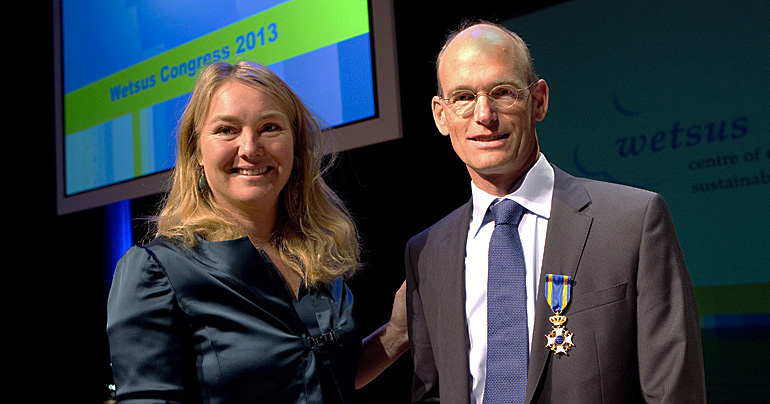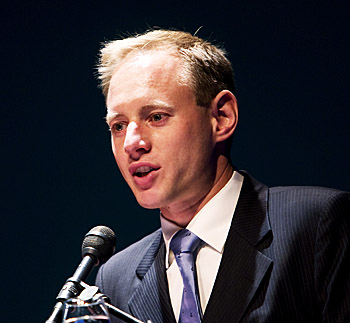“Wetsus is ideal place to develop truly innovative water technologies”
 Why is it that 5 of the last 20 truly innovative water technologies in the world, origin from the Netherlands? This rhetorical question was posed by investment manager dr. Reinhard Hübner of the German investment firm Skion on the celebration of the 10th anniversary of the centre of water technology Wetsus in Leeuwarden, the Netherlands, on 30 September.
Why is it that 5 of the last 20 truly innovative water technologies in the world, origin from the Netherlands? This rhetorical question was posed by investment manager dr. Reinhard Hübner of the German investment firm Skion on the celebration of the 10th anniversary of the centre of water technology Wetsus in Leeuwarden, the Netherlands, on 30 September.
According to Hübner, a key factor in this success is Wetsus as the institute developed an dedicated infrastructure linking real innovative concepts to existing water technology firms that have the capacity to bring new concepts to the market.
As a major driving force behind the celebrating centre, scientific director professor Cees Buisman (on photo right) was decorated as Knight in the Order of the Netherlands Lion. The special royal decoration was awarded upon him by the Dutch minister Melanie Schultz van Haegen (on photo left).
 Dr. Reinhard Hübner of Skion.
Dr. Reinhard Hübner of Skion.
Risk-aversive water utilities
In his key note dr. Hübner described the water sector as very conservative and reluctant to convert to new technologies. Only stricter standards and cost savings of over 30% can convince utilities to buy truly innovative water treatment technologies.
According to the Skion-director, in all other cases utilities react aversive to uncertainties of very advanced technologies.
Hübner told his audience that the risk-aversive attitude within the utility sector also has a positive aspect: "There is still room for innovation. But this requires patience. To be able to sell your product, you also have to educate the customer. Buy time, because it takes at least 5 years to get the first return on investment."
Unique r&d infrastructure
At the conference Hübner highlighted the close relation of Wetsus with existing water technology companies. "It is this combination of young people having new ideas and existing companies that make Wetsus so unique. Those companies have feed back from customers and know their markets."
Over the years Wetsus worked on a set of supplemental activities to be able to turn applied scientific research into innovative and commercial viable products. The applied scientific research takes place within the centre itself. Here some 95 companies and students from 18 universities and research institutes, work thematically closely together. The centre has its own laboratory.
Additionally a special facility, the Water Application Centre, has recently started where companies can construct their first pilot installations. On top of that, five demo sites have been created where these pilot installations can be 'plugged in' and tested under real circumstances. These demo sites are located at a nearby waste water treatment plant, a drinking water plant, a drinking water distribution network and, recently added to test the removal of pharmaceuticals from waste water, at a nearby hospital.
Finally there is also the Water Alliance , a public-private partnership to assist water technology firms to bring the newly developed products to the market.
Growing interest in Europe
Scientific director professor Cees Buisman of Wetsus noticed that international interest is growing fast lately. Especially from other European countries, such as Spain and the United Kingdom. "The European Union is reshaping its r&d programme and this year it will launch the new Horizon 2020 programme. Horizon 2020 will focus more on business based development of new knowledge. As we have already proven to be successful with such knowledge development, there is special interest in our centre from water technology companies and research institutes in EU-member states".
More information
Wetsus, centre of sustainable water technology
Leeuwarden, the Netherlands
+58 284 3000
www.wetsus.nl
Executive director Johannes Boonstra explains the unique concept of Wetsus as a water technology research centre.
Video clip to inform foreign students on Leeuwarden - capital of water technology



